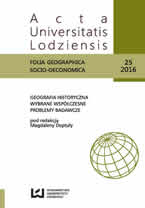Uwarunkowania tworzenia 'Sieci najciekawszych wsi'. Wyniki oceny eksperckiej 50 polskich miejscowości
Conditions for the Creation of 'The Most Interesting Villages' Network'. Results of the Evaluation of the Fifty Polish Settlements
Author(s): Marcin WójcikSubject(s): Education, Museology & Heritage Studies, Historical Geography, Environmental Geography, Applied Geography, Cultural Anthropology / Ethnology, Methodology and research technology, Social development, Rural and urban sociology, Economic development, Tourism
Published by: Wydawnictwo Uniwersytetu Łódzkiego
Keywords: rural areas; cultural heritage; methods of settlements research;
Summary/Abstract: Transformations that occur in Polish rural areas also impact tourism and recreation enterprises. Starting the rural development programs successfully activates processes of modernisation in many fields of social and economic life, including material base (infrastructure), which is an essential element in the functioning of settlement systems. The aim of this study is to present selected results of the expert analysis of 50 Polish villages, which are characterised by a high concentration of cultural values – material, institutional and spiritual. The assessment of a group of rural settlements was meant to determine the potential for creating the Network of the Most Interesting Villages (SNW). The article presents the factual basis for such evaluation, the differentiation in group of villages according to selected traits, especially those describing the infrastructural plane for developing the tourism and recreational functions. The recipe for success includes many elements. The most important ones include attractive spatial configuration in which there is no shortage of central locations that are the focus of educational and recreational functions, the social awareness of the value of one’s own heritage and the ability to describe it (the purpose of stay), the existence of long-lasting institutions referring to the historical memory and communal activities, the ability to create the media for narration placed in the internal environment, somewhat-formed path of its own development based on own resources (developed tourism functions), as well as participation in local and regional network of town with varying functions, and natural and anthropogenic environmental values (tourist regions).
Journal: Acta Universitatis Lodziensis. Folia Geographica Socio-Oeconomica
- Issue Year: 25/2016
- Issue No: 3
- Page Range: 109 - 129
- Page Count: 21
- Language: Polish

